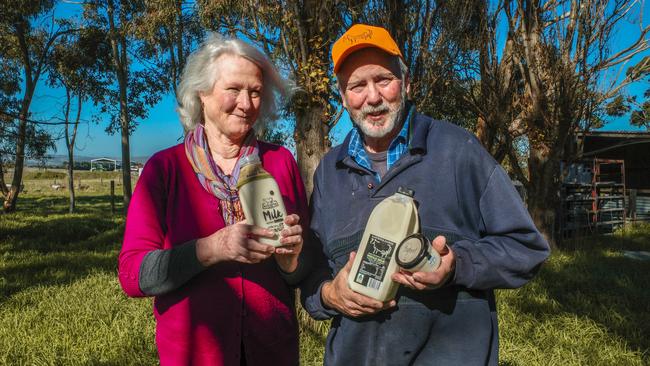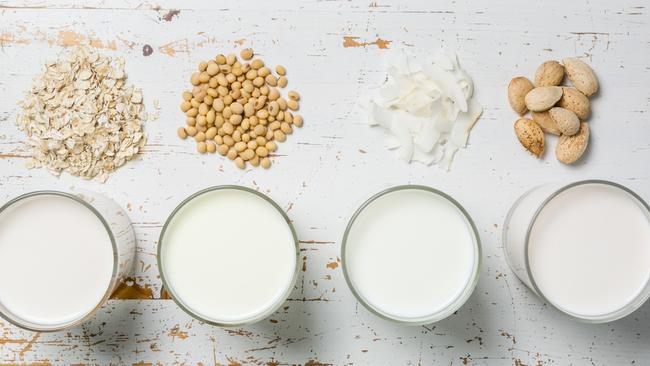Why dairy farmers must up their milk marketing game to combat veganism
Dairy farmers are being urged to refocus on whetting appetites for milk products, as new consumption data reveals opportunities.

The Australian dairy industry can no longer take for granted the assumption Australians drink milk with their coffee instead of nut-based alternatives, or nibble on slices of cheese instead of non-dairy substitutes.
Industry and marketing experts offer this message in the face of a rising vegan and vegetarian diet trend.
A number of businesses are focusing on building relationships with discerning customers with an appetite for premium Australian dairy products.
Figures from Dairy Australia paint an interesting picture of consumption in modern Australia.
Drinking milk consumption is about 97 litres a person; a small decline from the 105.7 litres per capita recorded in 2013-14.
Australians consume 13.6kg of cheese per capita, according to Dairy Australia, a figure the industry body said was “stable” compared with the 13.5kg per capita recorded in 2013-14.
A survey undertaken by Roy Morgan in 2019 reported about 2.5 million Australians – or 12.1 per cent of the population – stuck to a predominantly vegetarian diet.

Those figures were a lift on the 2.2 million people – or 11.2 per cent of the population – in 2014 who said they were vegetarian.
And while there is limited data regarding the uptake of vegan diets, changing consumer behaviour is one of the key drivers behind market trends, according to Gary Mortimer, Queensland University of Technology professor of consumer behaviour.
“When I present this to industry, I often ask people to put their hand up if they’ve recently drunk a tall glass of milk. No one puts their hands up,” Professor Mortimer said.
“We’ve seen a shift, people have shifted away from milk to alternatives and substitutes, such as drinking water, energy drinks, soft drinks and now alternative milks, such as nut milks. Markets will shift and change, because consumers shift in their preferences for products.”
It does not help that plant-based milk alternatives come with a savvy marketing campaign, selling their story of sustainability and health to consumers.
Plant-based milk alternative company Minor Figures, for example, markets itself according to its website as being an “independent, 100 per cent plant-based and carbon neutral” option for cafes and customers.
The brand has an interactive website, with grainy film-style photography and even a quirky online game consumers can play on their desktop, capitalising on its stance as a trendy and ethical non-dairy milk option.
Prof Mortimer said it was important to note while there was growth in the consumption of nut-based milk alternatives, “the growth is coming from a low base”.
“Only in the last few years have we seen vegan alternatives grow on supermarket shelves. How does the dairy industry respond? It needs to understand why consumers are making that choice,” he said.
“There tends to be this level of complacency, across the board … if you’re constantly doing the same thing and expecting a different outcome, it’s not going to happen.
“How do we re-engage with our customers and tell different stories? Or how do we pivot and adapt our business?”
Outside of supermarkets, a number of businesses are trending away from mass-produced cheese products and turning their attention to fostering intimate, authentic connections with customers.
Maker and Monger, at Prahran Market, is one example, providing cheese tastings and workshops to punters ambling through the market.
Milk the Cow licensed fromageries has store fronts across Melbourne’s inner suburbs, offering consumers the opportunity to pair Australian cheeses with whisky, wine and beer.
On the Bass Coast in southern Victoria, Bassine Specialty Cheeses at Glen Forbes is operated by Glen Bisognin and his partner, Kaye Courtney, along the busy Bass Highway.
The couple make cheeses and run a cafe and farmgate produce store, which opened in 2014.
The economic downturn that came with the Covid-19 pandemic last year resulted in Mr Bisognin selling his dairy herd, instead buying fresh milk daily from a dairy farm on Phillip Island.
But the business still produces artisan cheese and sells fresh whole milk in glass bottles.
A range of cheeses are available to consumers at IGA supermarkets in Cowes and San Remo on Phillip Island, in keeping with the business’s ethos of selling only within 100km of the dairy.
Mr Bisognin said the story of Australian dairying was pivotal to the business model of Bassine Specialty Cheeses, with customers connecting with the people producing the cheese and milk they consume.
But the industry needed to become better at selling its story, he said, and it should not be the farmer’s responsibility.
“They’re too busy doing it (farming), and they assume everyone knows they work hard,” Mr Bisognin said.
MORE



